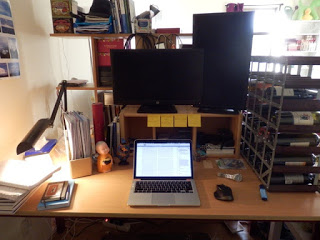I’m Igor Stepanov and This is How I Work
Today I am interviewing Igor Stepanov for the “How I Work” series. Igor is a 30-year-old PhD student at TU Delft and he is originally from the Republic of Serbia. He holds a MSc in Atmospheric physics and Meteorology and works as a researcher of cloud microphysical processes and precipitation using satellite observations and weather models. He has strong experience with EarthCARE Simulator (radar, lidar and multispectral imaging) and regional weather models
(WRF, ARPS, RCA). He is a data analyst and model developer, and enjoys team work, communication and coding.
Current Job: PhD student in final stage of writing the thesis (4 years and 6 months since beginning)
Current Location: Delft, The Netherlands
Current mobile device: Moto G 1st gen (2013)
Current computer: Macbook Pro 13” Late 2013
Can you briefly explain your current situation and research to us?
I enjoy clouds and precipitation for their unpredictable visuals but also studying processes that go on inside them. Currently in the “5th year” in the 4 year PhD project of investigating the impact of drizzle on cloud lifetime. This is a known occurrence in Stratocumulus clouds, but not well quantified in terms what triggers it as a physical process and how it influences the cloud radiative properties. I simulate high resolution remote sensing observations from the ground on frozen cloud scenes, followed by a simulation of satellite imagers. When these are compared, we investigate how representative either of these observations are and how we can learn about drizzle from real observations in various situations.
What tools, apps and software are essential to your workflow?
Surprisingly not many. I use a Mac to access the university network via iTerm, tuned with OhMyZsh and HomeBrew package manager. This is done via a typical ssh connection, after which I am placed into a Linux environment in which Python, Matlab, Bash and Vim make 99% of my workflow.
For latex writing I use a local Sublime3 editor, and back the progress up to a private GitHub repository.
For reading and organizing literature I use Mendeley Desktop, which database is synced to iPad Air 2, via Papership app. The latter is handy for traveling, although I find it hard to stay awake long enough on trains to reach the end of a 20+ pager.
What does your workspace setup look like?
I worked in a PhD pool office of some 30 students, at Civil Engineering Faculty. This is either a very quiet or a very noisy place, rarely somewhere in between. A pair of noise cancellation headphones was useful for those days. Since the thesis writing phase started 4 months ago, I began working from my living room. It has a desk with two external monitors, external keyboard and a huge must is a mouse (MX Master from Logitech, highly recommended if you have big hand and long fingers).
What is your best advice for productive academic work?
Routine. Have your wake up and going to sleep hours fixed, at least Monday to Friday.
Academic work is mostly stationary, behind a desk or in a lab, so physical exercise is something you can’t neglect. I stopped with playing basketball for a university team after 3 years when I decided to dedicate 100% to writing, but that lead to an increasing number of physical aches and expensive visits to the physiotherapists. So gym, swimming or running, what ever tickles your fancy – keep it! The intellectual academic part will be easy when your body can handle stationarity better.
How do you keep an overview of projects and tasks?
Usually having a new To-Do list for every week in the Note app on my computer. It has checkboxes which are very satisfying to tick. The worst weeks are those where “new” list is copy-paste of the previous week, with few new items in addition. Additionally I keep random notes and thoughts in two paper notebooks.
Besides phone and computer, do you use other technological tools in work and daily life?
iPad Air 2. Mainly for reading papers, email, social media.
Which skill makes you stand out as an academic?
I am interested in science that changes with time and advances in technology in particular. It possibly rubbed of from the general prototype thinking at the Delft University. For example drones and unmanned aircraft opened new possibilities for complementing the cloud research to the outdated instruments with known limitations. I get easily excited over new possibilities to improve measurements of analysis, but maybe that is by default programmed into every academic.
What do you listen to when you work?
Noise machine, combined with Romanian upbeat music on Spotify, especially in the afternoons.
What are you currently reading? How do you find time for reading?
Murakami`s 1Q84. I have a routine to read at least 15 minutes first thing when waking up and 15 minutes before going to sleep. I found this helpful to kick start the brain in the morning, instead of waiting for caffeine to do the trick (which I may have become numb to).
Are you more of an introvert or extrovert? How does this influence your working habits?
Both, and changing from one to another often. Even within the day several times.
I think the introvert part helps with the focus, organizing long term plans and thinking about changes in scientific approach to problems.
Extrovert part helps with taking a step back, to see things from a new perspective. Latter helps with networking possibly, such as during conferences where you have short time to meet many new people. Being both introvert and extrovert probably have downsides too, probably being unpredictable.
What’s your sleep routine like?
My alarm is set to 7.40am and I try to go to sleep before midnight. In reality, i fall asleep around 1am and wake up around 6.30am. Sometimes an afternoon nap takes care of it (since working from home started).
What’s your work routine like?
Start writing before 9am. Also all emails are answered here, especially the ones received almost 24 hours ago. When things start going slow around 10.30am, it’s time for a coffee. The part that starts here is probably the most productive one, until the lunch break (12.45ish). Longer session until dinner (6-7pm) follows, includes writing, typically double checking the data used for plots if something is missing, and filling the gaps in bibliography. After dinner is a break until 10pm, when it’s either time to review the plan for tomorrow of gym/running activity (lucky for the gym nearby that is open 24hours per day).
What’s the best advice you ever received?
Make a plan to create tranquility (PhD supervisor).



